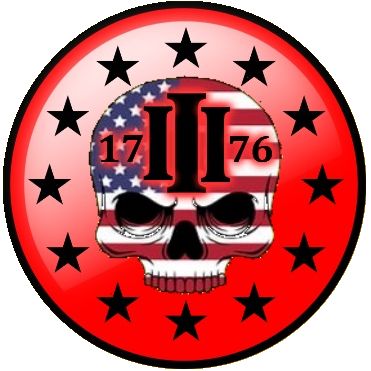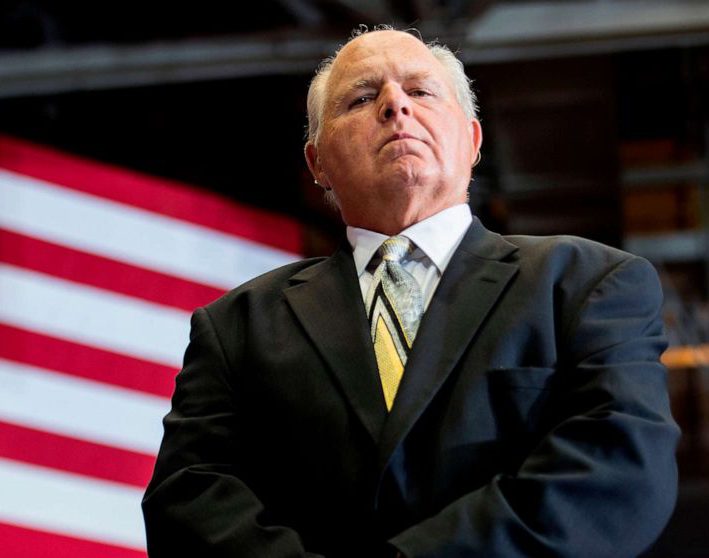January 12, 1951 – February 17, 2021
By Jaz McKay
Tuesday night, after almost three weeks of fill in host’s my wife Laura asked me if I thought Rush was ever coming back. I told her, “Oh yeah, I’m sure he’ll be back on the air any day now. He just needs some more time.”
Little did I know what I would hear at 9am California time this morning.
After listening to Glen Beck, after the nine o’clock top of the hour local news that old familiar theme song began. Expecting to hear Mark Steyn, Todd Herman or Mark Belling instead it was Kathryn, Rush’s beloved wife.
“It is with profound sadness that I must share with you directly that our beloved Rush, my wonderful husband, passed away this morning due to complications from lung cancer,” Mrs. Limbaugh said. “Rush will forever be the greatest of all time,” she continued.
My heart sank. It was true. Rush was gone.
It was something we all knew was coming but had stored away in the “denial file” of our minds for the past year. Not wanting to face the reality of the inevitable, we went about our daily routines since we got the news of his cancer in early 2020, assuming he would always be there for us. That at noon Eastern time every day we would hear the opening bass line of The Pretenders “My City Was Gone” and be greeted by that booming voice of reason to reassure us that we had nothing to panic over until HE told us it was time to panic.
But in the back of all our minds we knew that day would come, and sadly it did.
Kathryn praised her husband as an “irreplaceable, remarkable talent. Rush was an extraordinary man, a gentle giant, quick-witted,” she explained, “the hardest working person I know … He was polite and respectful to everyone he met. From today on there will be a tremendous void ion our lives and, of course, in our country. Rush often stood up and took arrows on his own because he knew it was the right thing to do. Rush gave us hope that through hard work and determination we can be our best.”
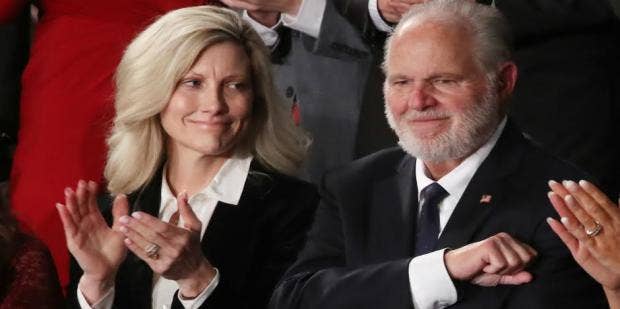
Rush Limbaugh, the monumentally influential media icon who transformed talk radio and politics in his decades behind the Golden EIB microphone , helping shape the modern-day Republican Party, had died Wednesday at the age of 70 after a battle with lung cancer.
His “Excellence in Broadcasting” network aired sounds clips of Rush Limbaugh himself, referring to the day he would pass away.

“The day is gonna come when I’m not gonna be able to do this,” Rush said in one clip. “Even when the day comes, I’d like to be here. I have this sense of needing to show my appreciation.”
The radio icon learned he had Stage IV lung cancer in January 2020 and was awarded the Presidential Medal of Freedom by President Trump at the State of the Union address days later. First lady Melania Trump then presented America’s highest civilian honor to Limbaugh in an emotional moment on the heels of his devastating cancer diagnosis.
“Rush Limbaugh: Thank you for your decades of tireless devotion to our country,” President Trump said during the address.
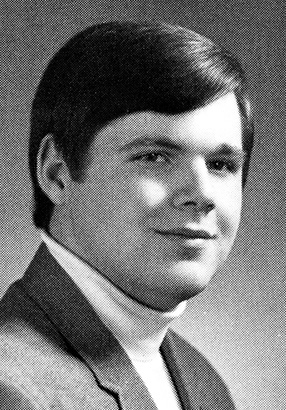
In February 1971, after dropping out of college, the 20-year-old Limbaugh accepted an offer to DJ at WIXZ, a Top 40 station in McKeesport, Pennsylvania. He adopted the airname “Bachelor Jeff” Christie and worked afternoons before moving to morning drive.
“I was totally consumed,” Limbaugh told the New York Times in 1990, noting that his idol was a Chicago radio host named Larry Lujack.
As the morning radio host in Pittsburgh, where he was oddly told to cover a certain amount of “farm news” because the area was surrounded by many agriculture communities. In 2007 he explained to listeners how the young radio host managed to keep listeners despite the bizarre requirement.
“The last thing that the audience of my show cares about is farm news. If farm news came on, bam! They pushed the button and go somewhere else. So, we had to figure out, ‘Okay, how do we do this and protect the license?’ So I turned the farm news every day into a funny bit with farm sound effects and the roosters crowing and so forth, and I’d make fun of the stockyard feed prices or whatever it was, so that we could say, ‘We’re doing barn news,’ agriculture news. There was all kinds of things like that,” Limbaugh told listeners.
The tidbit offered a glimpse into Limbaugh’s early days, proving that he was a master of keeping audiences engaged from a young age.

In late 1974, Limbaugh was dismissed after new management put pressure on the program director to fire him. Limbaugh recalled the general manager telling him that he would never land success as an air personality and suggested a career in radio sales.
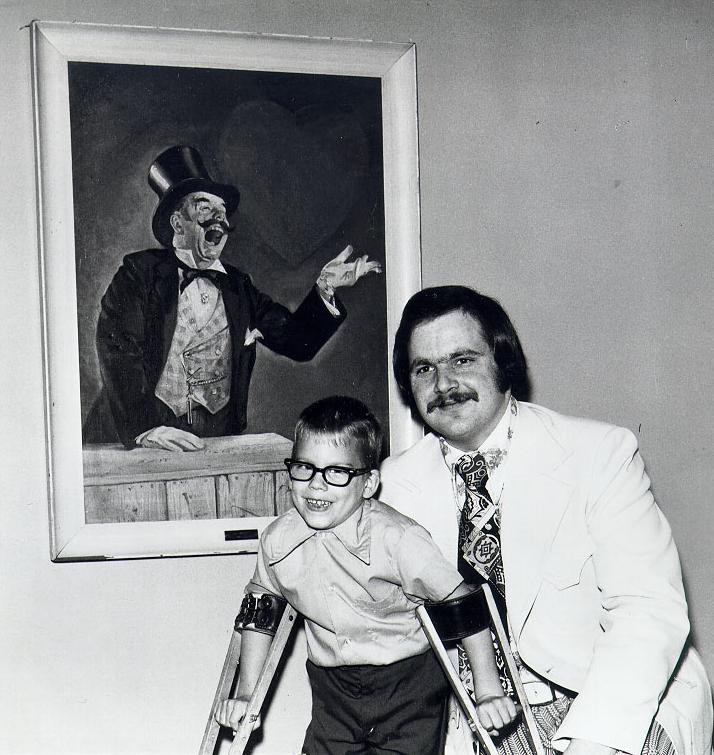
In 1979, he accepted a part-time role in group sales for the Kansas City Royals baseball team which developed into a full-time position as director of group sales and special events. He worked from the Royals Stadium.
Limbaugh has said he realized America was the “greatest country ever” when taking trips to Europe and Asia in his late 20s and early 30s, an experience that helped shape his political views.

“I was literally interested in how that happened, and then I started to think about all the other things that we led the world in: Manufacturing, technology, innovation, invention, creation, and it all led back to liberty and freedom and the pursuit of happiness and dreams coming true and working hard for whatever you want and being able to do what you love, not just have to dream about it.”

From that point forward, Limbaugh believed that “American exceptionalism” shouldn’t be frowned upon, and his conservative views became more prominent.

“We stood for the concepts that are in our Declaration of Independence: Right to life, liberty, pursuit of happiness. We stood for that, and we were the beacon for it, and to this day that is why the oppressed of the world still seek to come into this country,” he said.
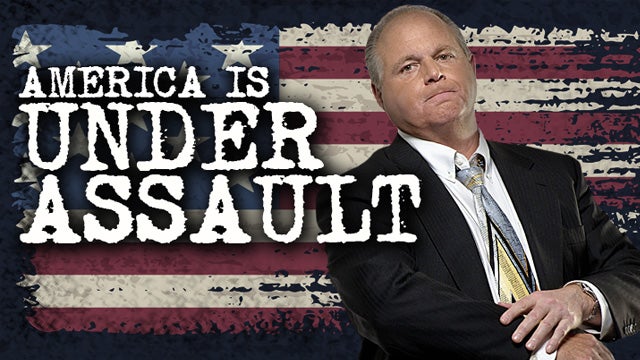
Limbaugh also credited National Review founder William F. Buckley Jr. for teaching him how to articulate conservative views.
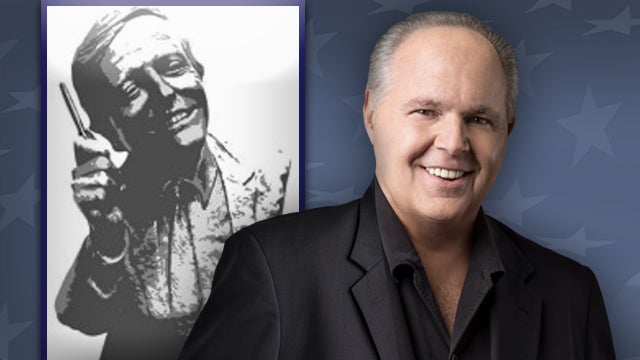
“He single-handedly is responsible for my learning to form and frame my beliefs and express them verbally in a concise and understandable way,” Limbaugh once said.

In November 1983, Limbaugh returned to radio at KMBZ (AM) in Kansas City for a year. He decided to drop his on-air moniker and broadcast under his real name. He was fired from the station, but weeks later he landed a spot on KFBK in Sacramento, California, replacing Morton Downey Jr. The show launched on October 14, 1984.
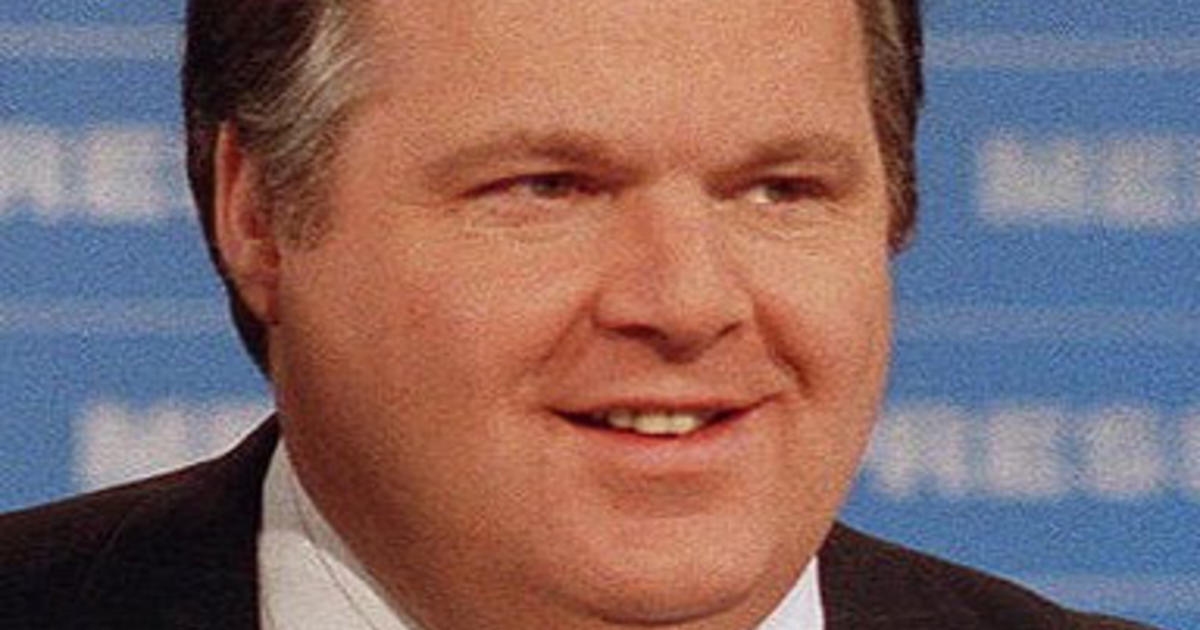
The repeal of the Fairness Doctrine—which had required that stations provide free air time for responses to any controversial opinions that were broadcast—by the FCC on August 5, 1987, meant stations could broadcast editorial commentary without having to present opposing views. Daniel Henninger wrote, in a Wall Street Journal editorial, “Ronald Reagan tore down this wall (the Fairness Doctrine) in 1987 … and Rush Limbaugh was the first man to proclaim himself liberated from the East Germany of liberal media domination.”
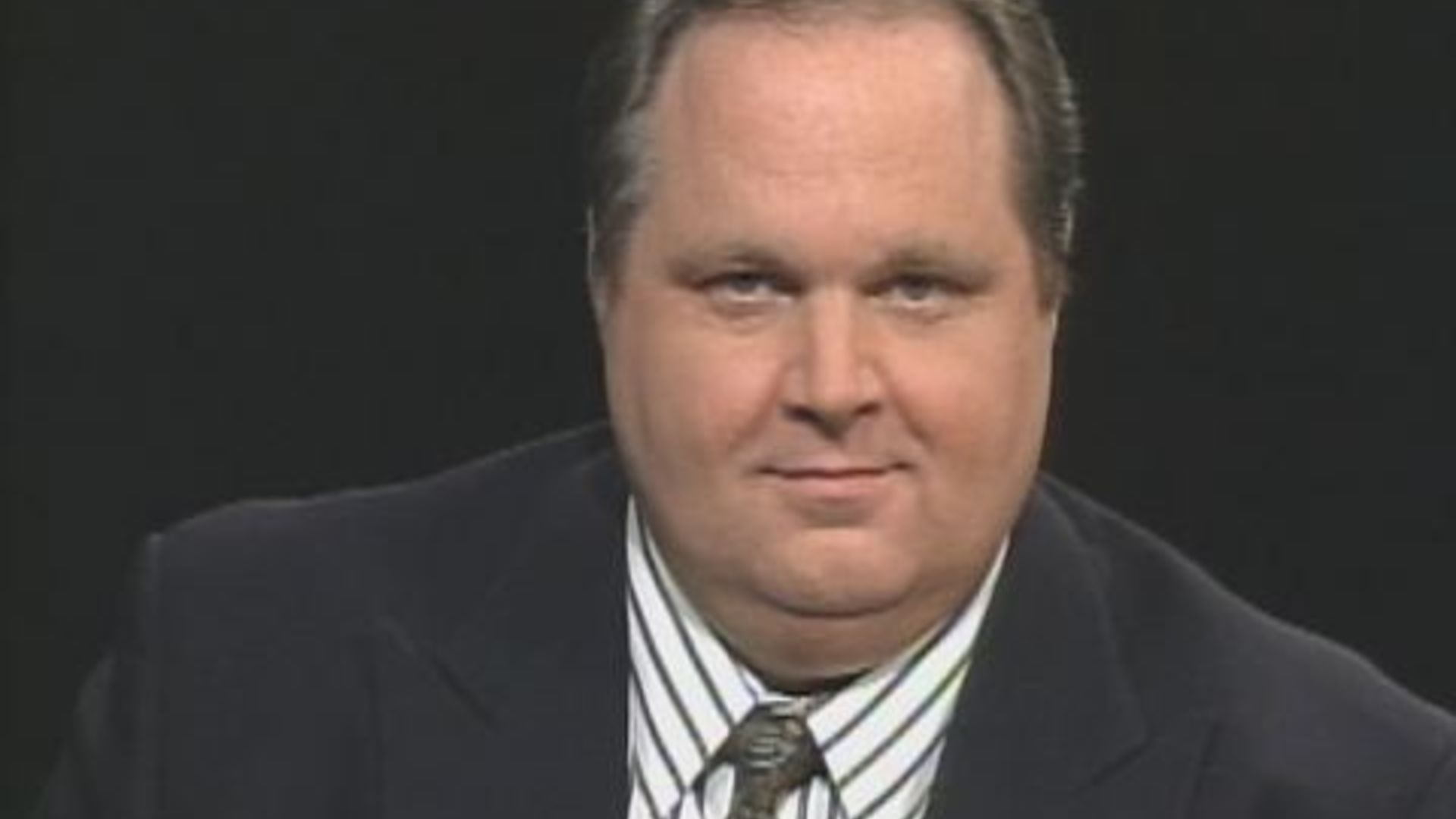
In July 1988, after his success in Sacramento caught the attention of former ABC Radio President Edward McLaughlin, Limbaugh began a new show at WABC (AM) in New York City. It was there that he changed talk radio forever when “The Rush Limbaugh Show” became a cultural phenomenon for both the message and the way it was delivered.

“Unlike most radio talkers, who affect a casual, intimate style, Limbaugh sounds like he’s on a soapbox. He is intoxicated by words, especially those flowing from his own lips. His vocabulary is extensive; his diction tends to the grandiosely formal, though overblown to the point of self-parody. His nervous energy plays out through hands that never stop moving. They rattle the papers, slap the desk, punch the console. Whap! Whap! Whump! This muted percussion is often heard on the air, a rhythmic accompaniment to Limbaugh’s voice,” author Lewis Grossberger wrote in New York Times Magazine in 1990.
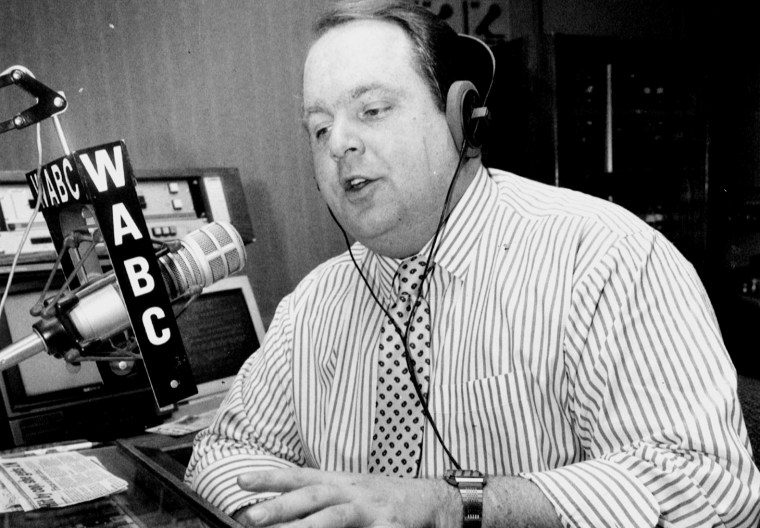
“Thanks for all you’re doing to promote Republican and conservative principles. Now that I’ve retired from active politics, I don’t mind that you have become the Number One voice for conservatism in our country,” President Ronald Reagan once wrote in a letter to Limbaugh that was published by National Review in 2003.

“I know the liberals call you ‘the most dangerous man in America,’ but don’t worry about it, they used to say the same thing about me. Keep up the good work. America needs to hear the way things ought to be,” Reagan continued.
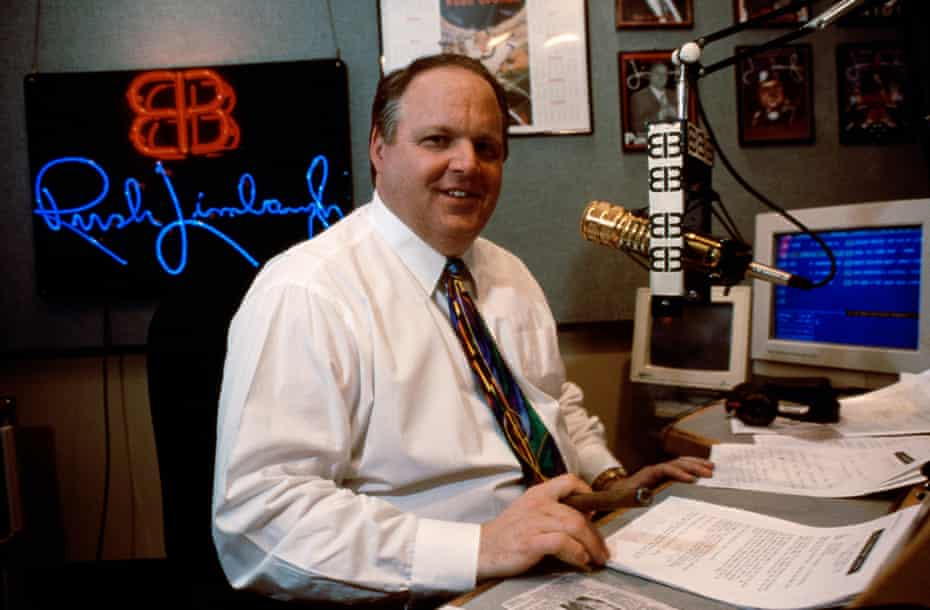
Limbaugh was eventually enshrined in the Radio Hall of Fame and the National Association of Broadcasters Hall of Fame. He was a five-time winner of the National Association of Broadcasters Marconi Award for “Excellence in Syndicated and Network Broadcasting,” a No. 1 New York Times bestselling author and was named one of Barbara Walters’ 10 Most Fascinating People in 2008 and one of TIME’s 100 Most Influential People in the World in 2009.

While Limbaugh made his career on radio, a speech he delivered at the Conservative Political Action Conference (CPAC) in 2009 is widely considered one of the most important moments of his career — an explanation of “who conservatives are” that caused the crowd to erupt with chants of “USA! USA!”

“We love people. When we look out over the United States of America, when we are anywhere, when we see a group of people, such as this or anywhere, we see Americans. We see human beings. We don’t see groups. We don’t see victims. We don’t see people we want to exploit. What we see — what we see is potential. We do not look out across the country and see the average American, the person that makes this country work. We do not see that person with contempt. We don’t think that person doesn’t have what it takes. We believe that person can be the best he or she wants to be if certain things are just removed from their path like onerous taxes, regulations and too much government,” Limbaugh told the crowd.

“We want every American to be the best he or she chooses to be. We recognize that we are all individuals. We love and revere our founding documents, the Constitution and the Declaration of Independence,” he continued. “We believe that the preamble to the Constitution contains an inarguable truth that we are all endowed by our creator with certain inalienable rights, among them life, liberty, Freedom and the pursuit of happiness.”

In June 2010 Rush married Kathryn, a party planner from Florida. It was his fourth marriage. During the wedding reception after the ceremony, Elton John entertained the wedding guests.

From 1990 until his death, Limbaugh held an annual fundraising telethon called the “EIB Cure-a-Thon” for the Leukemia & Lymphoma Society. In 2006, the EIB Cure-a-Thon conducted its 16th annual telethon, raising $1.7 million, totaling over $15 million since the first cure-a-thon.
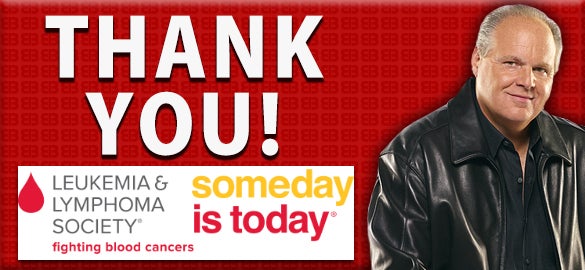
Limbaugh also conducted an annual drive to help the Marine Corps–Law Enforcement Foundation collect contributions to provide scholarships for children of Marines and law enforcement officers and agents who have died in the line of duty.

In July 2019 Nike announced a special Fourth of July edition of their Air Max 1 Quick Strike sneaker that featured the thirteen-star Betsy Ross flag. The company withdrew the sneaker after their spokesman Colin Kaepernick raised concerns that the symbol represented an era of black enslavement.

In response Limbaugh’s radio program introduced a t-shirt imprinted “Stand up for Betsy Ross” with sale proceeds to benefit the Tunnel to Towers Foundation. As of December 2019, the sales have earned over US$5 million for the foundation.
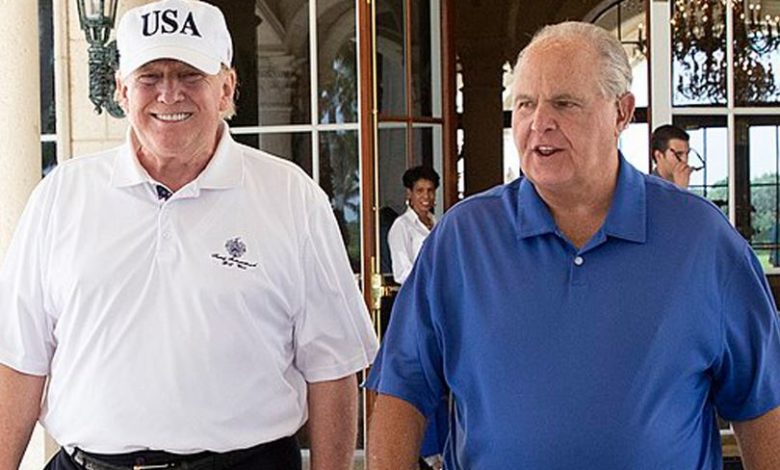
Limbaugh helped boost Trump’s influence prior to the 2016 election simply by taking him seriously as a candidate when other established conservatives didn’t want the former reality television star anywhere near the Republican Party. Many of Limbaugh’s listeners eventually became Trump supporters and the radio legend continued to defend Trump throughout his presidency despite occasional disagreements.
In the heat of the 2020 presidential election, Limbaugh hosted Trump in October for what was an unprecedented two-hour “radio rally”, during which the president was virtually given control of the coveted golden microphone to answer questions from the host and his listeners.

In his final radio broadcast of 2020, Limbaugh thanked his listeners and supporters, revealing at the time that he had outlived his prognosis.
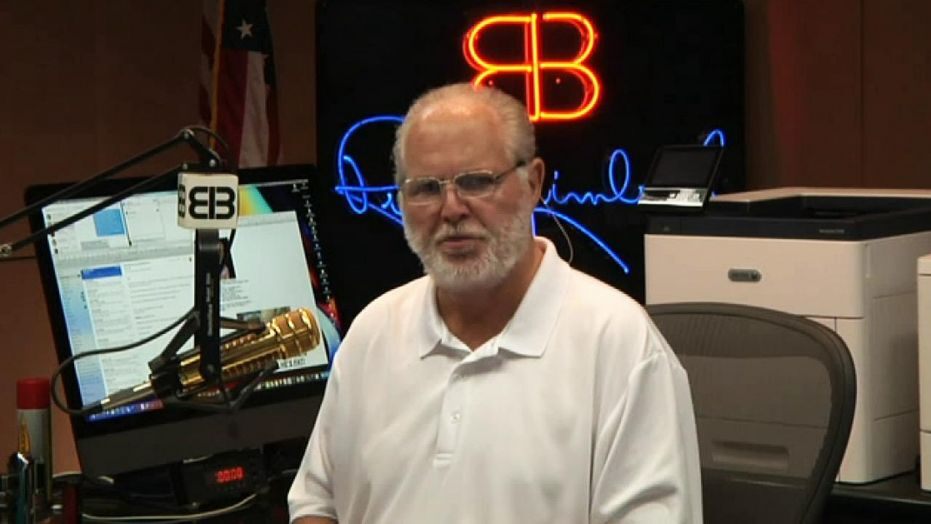
“I wasn’t expected to be alive today,” he said. “I wasn’t expected to make it to October, and then to November, and then to December. And yet, here I am, and today, got some problems, but I’m feeling pretty good today.”
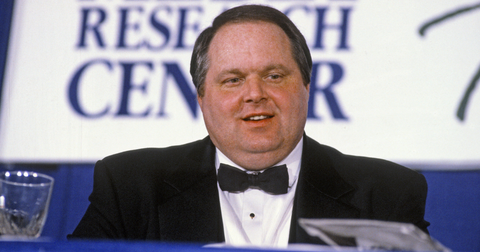
The program that began 33 years ago on national syndication with only 56 radio stations grew to be the most listened-to radio show in the United States, airing on more than 600 stations, according to the show’s website. Up to 27 million people tuned in on a weekly basis and Limbaugh has lovingly referred to his passionate fan base as “Dittoheads,” as they would often say “ditto” when agreeing with the iconic radio host.

Rush truly loved what he did for a living. That was evident in the fact that he was there as often as he could humanly do it in the year leading up to his death. He wanted, more than anything to be in front of the Golden EIB Microphone every day for three hours with us, his devoted listeners.

One of the things I loved most about listening to him was how he would tweek the liberals who were listening. He had a way of poking them a little, just enough that we all knew they were going to be “totally outraged” at whatever it was he’d just said and we’d all join in on the joke and have a good laugh along with him as he winked at us.
Yes, Rush had a way of winking at us over the air. You could actually hear him wink. I mean, think about that for a moment. That is nothing short of amazing. I’m sure going to miss that wink.
More than a spokesman for conservative domestic and foreign policies or Republican politicians in congress, Rush Limbaugh was a spokesman for free speech.
Rush never once called for a boycott of the Left, he never called for one single person on the Left to be cancelled. He surprised a lot of traditional conservatives by publicly supporting people like Howard Stern and Opie & Anthony when they were under attack. He was consistent in his beliefs, and that was just one of many lessons he taught at The Limbaugh Institute For Advanced Conservative Studies.

Rush spoke his mind and refused to apologize for it. He used humor and satire to get his point across and didn’t shy away from his critics but instead used their own words to ridicule and mock them. In the early 90’s when the Left dubbed him “the most dangerous man in America”, rather than back down and avoid the phrase or whine and beg for forgiveness, he embraced it and used the term as a badge of honor by adopting it as his official moniker.
We must be up for the same challenge and encourage others to follow Rush Limbaugh’s lead But how? First of all we must promote our message, get it out to the masses using the same media the left uses in their attempts to silence and shame us. And most importantly never back down.
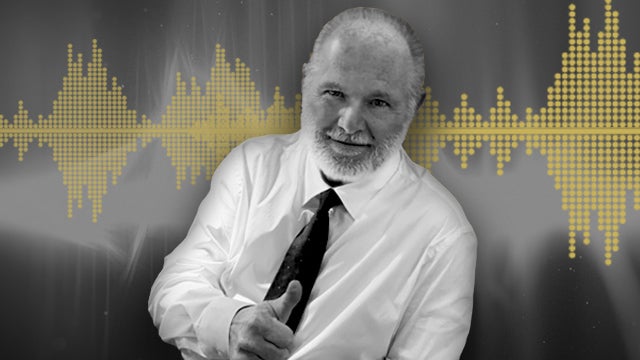
Thank you Rush for 33 years of Excellence in Broadcasting, and the many life lessons we have learned from your deep wisdom, compassion and humility. You truly made this country a better nation
You were the conservative movement’s 5-Star General. You educated us on what it means to be a conservative and how to fight with grace and passion for what we believe in.
From me personally, thank you for your great influence on my career and showing me how to stand up to those who wish to knock me down throughout my 45 years in radio.. To never let the critical words or deeds of of the opposition intimidate me or silence my voice. You showed me how evil is powerless, when the good are fearless. Always be relentless, brave and bold and most of all, never let them see you sweat.
For those things, I am forever indebted to you.
Brother can you spare a dime to support independent media?
Unlike the Lame Stream Media we are NOT funded by Bill & Melinda Gates, or George Soros. So a few coins in our jar to help us keep going are always appreciated. [wpedon id=441]
Views: 105
